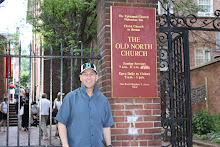Continuing Reflections on the Restoration Movement in Western Canada, Part 6
In light of
the largely autonomous character of the churches of the Stone-Campbell
Movement, there is often only a loose connection that exists between the
churches of the Movement in any given geographical area. This fact stems
from the initial ethos of the Movement, from the different divisions within the
Movement that have occurred over the years, and, in the case of western
Canadian a cappella churches, the closing of Western Christian College.
I am of the
opinion that the relative autonomy of our churches can be very healthy in some
ways; in other ways it is of detriment. There is something healthy about
individual churches being free to operate for themselves, with locally
empowered leaders whose authority and service is centered in their own
congregations. A church's finances are controlled by and allocated by
local leadership. Ministry is locally controlled and planned. And
this seems to fit with the function of churches under the Apostles in the New
Testament. But it can be of detriment that our churches share less of a
broader cohesive unity than they otherwise could. They are not as much
"part of something bigger" as they could be. When the Movement
began, and for years afterward, there was an identity for those churches which
automatically came with being part of the Movement itself, set apart from the
rest of Christianity that was not following the teachings of the Campbells,
Walter Scott, and Barton Stone. Those churches and individual Christians
who did follow early Stone-Campbell teachings on biblical primitivism and
Christian unity became an identifiable union of churches; it gave them a
broader identity and purpose. That we substantially lack this common
identity and purpose prevents us from having a cohesive ministry. The
positive aspects of the Movement are not instilled in those new to us, or even
our own children, and there is no common voice that can positively impact the
ministries of other Christian fellowships around us.
All that to
say that with a push from Evan Spencer, who is leading the new Bow Valley
multi-site in Mahogany in south Calgary, there is going to be an attempt made
to create a closer unity among churches in western Canada that find their
historical roots in the Stone-Campbell Movement. The goals will include 1) unity, fellowship,
and encouragement among our churches; 2) cohesion, visioning and purposefulness
in ministry; 3) providing a source of cohesive impact by the Stone-Campbell
churches on Christianity as practiced in western Canada.
Plans are
being formulated concerning how best to proceed. Two moves most likely to be made here at the
beginning are: 1) use the 3 Streams
website that is already in existence.
The website was initiated by the group that through Alberta Bible
College sponsors the Western Canada Leadership Summit each spring at ABC, but the
goal of having the website is to provide connection for Stone-Campbell churches
across Canada; 2) have some kind of initial meeting introducing the idea of cohesion between the Stone-Campbell churches
of western Canada, forming a steering committee of interested church representatives.
If you are
interested in what is being proposed, please feel free to comment or send to me
an email (Kelly@calgarycofc.com). And you will want to look at
the existing 3 Streams website at www.3streams.ca
if you have not already.
